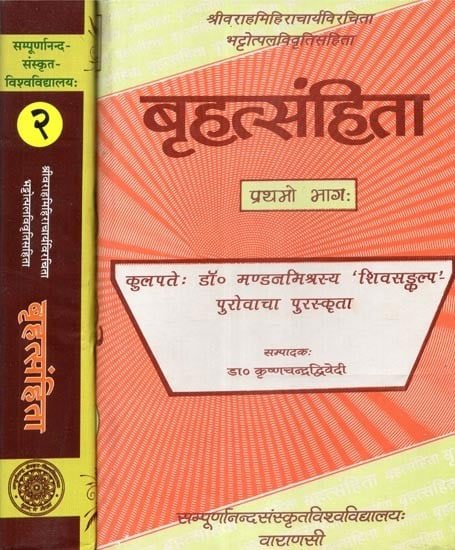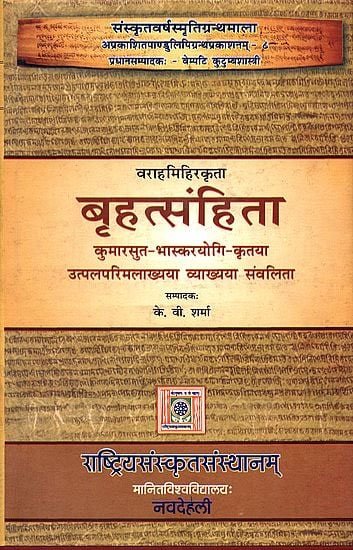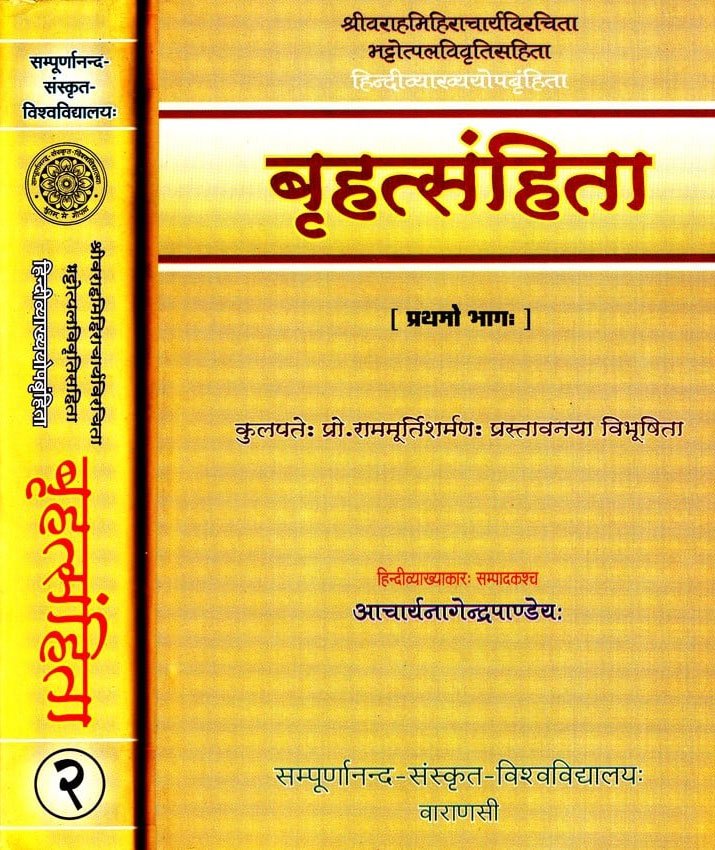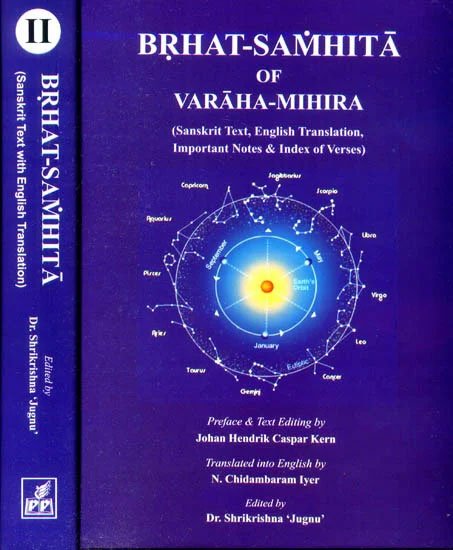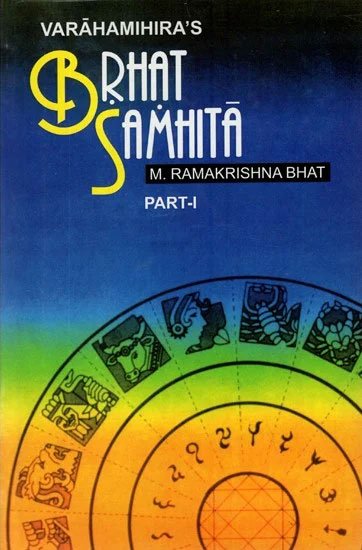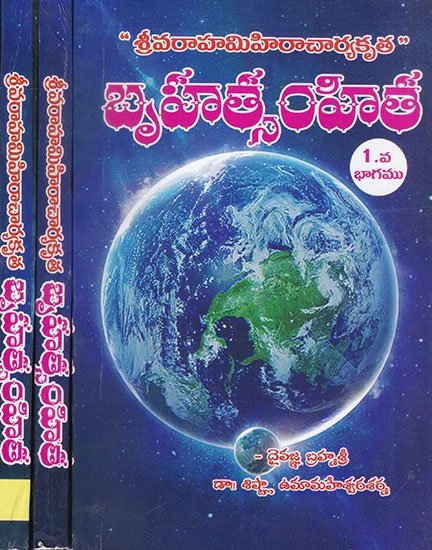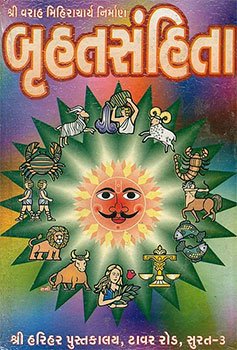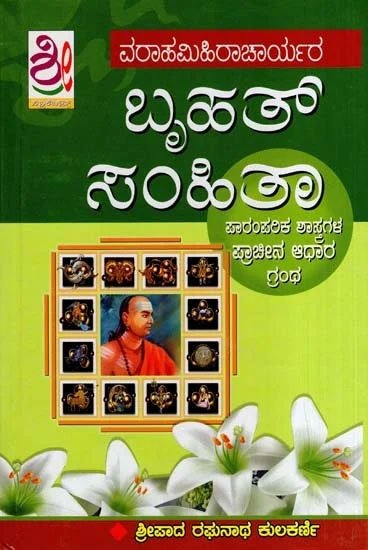Brihat-samhita [sanskrit]
26,560 words
The Sanskrit text of the Brihat-samhita from the 6th-century authored by Varaha Mihira in present-day Ujjain, India. It primarily deals with astrology and astronomy but is presented as an encyclopedia of knowledge.
Verse 95.R(19)
लग्ने नकारो हिबुके तकारस्तुले णकारो मकरे टकारः ।
इत्येतदुक्तं चरसंज्ञकस्य वक्ष्ये स्थिराख्यस्य चतुष्टयस्य ॥ र्(१९) ॥
lagne nakāro hibuke takārastule ṇakāro makare ṭakāraḥ |
ityetaduktaṃ carasaṃjñakasya vakṣye sthirākhyasya catuṣṭayasya || R(19) ||
The Sanskrit text of Verse 95.R(19) is contained in the book Brihata Samhita (Sanskrit Text with Hindi Translation) by Pandit Achyutananda Jha. This book is available online or you could buy the latest edition:
Read online Buy now! The Sanskrit text by Pandit Achyutananda Jha (2001)
Glossary of Sanskrit terms
Note: This extracts Sanskrit terms and links to English definitions from the glossary, based on an experimental segmentation of verse (95.R(19)). Some terms could be superfluous while some might not be mentioned. Click on the word to show English definitions.
Lagna, Nakara, Hibuka, Takara, Tula, Makara, Iti, Itya, Etad, Ukta, Cara, Sanjnaka, Vakshya, Sthira, Akhya, Catushtaya,
Analysis of Sanskrit grammar
Note: this is an experimental feature and only shows the first possible analysis of the Sanskrit text (Verse 95.R(19)). If the system was successful in segmenting the sentence, you will see of which words it is made up of, generally consisting of Nouns, Pronouns, Verbs, Participles and Indeclinables. Click on the link to show all possible derivations of the word.
- Line 1: “lagne nakāro hibuke takārastule ṇakāro makare ṭakāraḥ ”
- lagne -
-
lagna (noun, masculine)[locative single]lagna (noun, neuter)[nominative dual], [vocative dual], [accusative dual], [locative single]lagnā (noun, feminine)[nominative dual], [vocative single], [vocative dual], [accusative dual]√lag -> lagna (participle, masculine)[locative single from √lag class 1 verb]√lag -> lagna (participle, neuter)[nominative dual from √lag class 1 verb], [vocative dual from √lag class 1 verb], [accusative dual from √lag class 1 verb], [locative single from √lag class 1 verb]√lag -> lagnā (participle, feminine)[nominative dual from √lag class 1 verb], [vocative single from √lag class 1 verb], [vocative dual from √lag class 1 verb], [accusative dual from √lag class 1 verb]
- nakāro* -
-
nakāra (noun, masculine)[nominative single]
- hibuke -
-
hibuka (noun, neuter)[nominative dual], [vocative dual], [accusative dual], [locative single]
- takāras -
-
takāra (noun, masculine)[nominative single]
- tule -
-
tula (noun, masculine)[locative single]tulā (noun, feminine)[nominative dual], [vocative single], [vocative dual], [accusative dual]
- ṇakāro* -
-
ṇakāra (noun, masculine)[nominative single]
- makare -
-
makara (noun, masculine)[locative single]
- ṭakāraḥ -
-
ṭakāra (noun, masculine)[nominative single]
- Line 2: “ityetaduktaṃ carasaṃjñakasya vakṣye sthirākhyasya catuṣṭayasya || R(19) |”
- itye -
-
iti (indeclinable particle)[indeclinable particle]iti (noun, feminine)[compound], [adverb], [nominative dual], [vocative dual], [accusative dual]itya (noun, masculine)[locative single]itya (noun, neuter)[nominative dual], [vocative dual], [accusative dual], [locative single]ityā (noun, feminine)[nominative dual], [vocative single], [vocative dual], [accusative dual]√i -> itya (participle, masculine)[locative single from √i class 2 verb]√i -> itya (participle, neuter)[nominative dual from √i class 2 verb], [vocative dual from √i class 2 verb], [accusative dual from √i class 2 verb], [locative single from √i class 2 verb]√i -> ityā (participle, feminine)[nominative dual from √i class 2 verb], [vocative single from √i class 2 verb], [vocative dual from √i class 2 verb], [accusative dual from √i class 2 verb]
- etad -
-
etad (indeclinable)[indeclinable]etad (noun, masculine)[compound], [adverb], [nominative single], [vocative single]etad (noun, neuter)[compound], [nominative single], [accusative single]
- uktam -
-
ukta (noun, masculine)[adverb], [accusative single]ukta (noun, neuter)[adverb], [nominative single], [accusative single]uktā (noun, feminine)[adverb]√vac -> ukta (participle, masculine)[accusative single from √vac class 2 verb], [accusative single from √vac class 3 verb]√vac -> ukta (participle, neuter)[nominative single from √vac class 2 verb], [accusative single from √vac class 2 verb], [nominative single from √vac class 3 verb], [accusative single from √vac class 3 verb]
- cara -
-
cara (noun, masculine)[compound], [vocative single]cara (noun, neuter)[compound], [vocative single]√car (verb class 1)[imperative active second single]
- sañjñakasya -
-
sañjñaka (noun, masculine)[genitive single]sañjñaka (noun, neuter)[genitive single]
- vakṣye -
-
√vakṣ -> vakṣya (participle, masculine)[locative single from √vakṣ class 1 verb], [locative single from √vakṣ]√vakṣ -> vakṣya (participle, neuter)[nominative dual from √vakṣ class 1 verb], [vocative dual from √vakṣ class 1 verb], [accusative dual from √vakṣ class 1 verb], [locative single from √vakṣ class 1 verb], [nominative dual from √vakṣ], [vocative dual from √vakṣ], [accusative dual from √vakṣ], [locative single from √vakṣ]√vakṣ -> vakṣyā (participle, feminine)[nominative dual from √vakṣ class 1 verb], [vocative single from √vakṣ class 1 verb], [vocative dual from √vakṣ class 1 verb], [accusative dual from √vakṣ class 1 verb], [nominative dual from √vakṣ], [vocative single from √vakṣ], [vocative dual from √vakṣ], [accusative dual from √vakṣ]√vah (verb class 1)[future middle first single]√vakṣ (verb class 1)[present passive first single]√vakṣ (verb class 0)[present passive first single]
- sthirā -
-
sthira (noun, masculine)[compound], [vocative single]sthira (noun, neuter)[compound], [vocative single]sthirā (noun, feminine)[nominative single]
- ākhyasya -
-
ākhya (noun, masculine)[genitive single]ākhya (noun, neuter)[genitive single]
- catuṣṭayasya -
-
catuṣṭaya (noun, masculine)[genitive single]catuṣṭaya (noun, neuter)[genitive single]
- Cannot analyse R19
Other editions:
Also see the following editions of the Sanskrit text or (alternative) English translations of the Verse 95.R(19)
Brhatsamhita with the Commentary of Bhattotpala
by Krishna Chandra Dwivedi (2016)
Publisher: Sampurnanand Sanskrit University; 1229 pages;
Buy now!
Brihat Samhita with the Commentary of Utpalapatimala of Yogisvara
by K. V. Sharma (2012)
Publisher: Rashtriya Sanskrit Sansthan, Janakpuri; 754 pages; ISBN-10; 8186111360; ISBN-13: 9788186111369
Buy now!
Brihat Samhita (Hindi Translation)
by K. V. Sharma (2002)
Publisher: Sampurnanand Sanskrit University; 2359 pages; ISBN-13: 9789387890008.
Buy now!
Brhat Samhita (English translation)
by N. Chidambaram Iyer (2022)
Publisher: Parimal Publication Pvt. Ltd.; 801 pages; Edited by Dr. Shrikrishna Jugnu; ISBN-10: 8171104215; ISBN-13: 9788171104215.
Buy now!
Brhat Samhita (English with notes)
by M. Ramakrishna Bhat (2010)
Publisher: Motilal Banarsidas Publishers Pvt. Ltd.; 1155 pages; ISBN-10: 8120810600; ISBN-13: 9788120810600.
Buy now!
Brhat Samhita (Telugu translation)
by Sishtla Umamaheswara Sharma (2020)
Publisher: Mohan Publications, Andhra Pradesh; 846 pages.
Buy now!Preview of verse 95.r(19) in Kannada sript:
ಲಗ್ನೇ ನಕಾರೋ ಹಿಬುಕೇ ತಕಾರಸ್ತುಲೇ ಣಕಾರೋ ಮಕರೇ ಟಕಾರಃ ।
ಇತ್ಯೇತದುಕ್ತಂ ಚರಸಂಜ್ಞಕಸ್ಯ ವಕ್ಷ್ಯೇ ಸ್ಥಿರಾಖ್ಯಸ್ಯ ಚತುಷ್ಟಯಸ್ಯ ॥ ರ್(೧೯) ॥
Brhat Samhita (Gujarati translation)
by - (2000)
Publisher: Shree Harihar Pustakalay, Surat; Author: Shri Varahamihira Acharya (શ્રી વરાહમિહીરાચાર્ય); 432 pages.
Buy now!Preview of verse 95.r(19) in Gujarati sript:
લગ્ને નકારો હિબુકે તકારસ્તુલે ણકારો મકરે ટકારઃ ।
ઇત્યેતદુક્તં ચરસંજ્ઞકસ્ય વક્ષ્યે સ્થિરાખ્યસ્ય ચતુષ્ટયસ્ય ॥ ર્(૧૯) ॥
Brhat Samhita (Kannada translation)
by Sripada Raghunatha Kulkarni (2021)
Publisher: Srinidhi Publications, Bangalore; 668 pages with illustrations.
Buy now!Preview of verse 95.r(19) in Kannada sript:
ಲಗ್ನೇ ನಕಾರೋ ಹಿಬುಕೇ ತಕಾರಸ್ತುಲೇ ಣಕಾರೋ ಮಕರೇ ಟಕಾರಃ ।
ಇತ್ಯೇತದುಕ್ತಂ ಚರಸಂಜ್ಞಕಸ್ಯ ವಕ್ಷ್ಯೇ ಸ್ಥಿರಾಖ್ಯಸ್ಯ ಚತುಷ್ಟಯಸ್ಯ ॥ ರ್(೧೯) ॥
![Brihat-samhita [sanskrit] - book cover](/uploads/a/Brihat-Samhita-Sanskrit.jpg)
